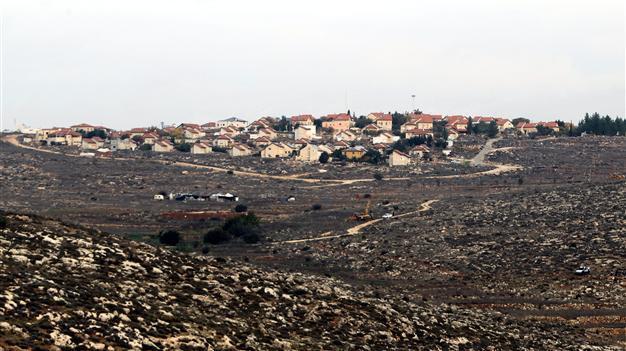Israel moves ahead with E1 settlement plans
JERUSALEM

EPA photo
Israel moved forward on Wednesday with plans to build some 3,000 settler homes in one of the most sensitive areas of the occupied West Bank, in defiance of international protests, Reuters has reported.A Defence Ministry official said architects and contractors appeared before a subcommittee of the military-run Civil Administration in the West Bank and registered their plans for construction in the E1 corridor near Jerusalem, a preliminary step before any building permits are issued.
Angered by the U.N. General Assembly's de facto recognition of Palestinian statehood on Thursday, Israel announced the next day it would build the new dwellings for settlers, on land near Jerusalem that Palestinians seek for a future state.
The decision by Prime Minister Benjamin Netanyahu's pro-settler government to build houses in E1 for the first time raised the alarm among Palestinians and in world capitals.
Israeli housing on the corridor's barren hills could bisect the West Bank, cut off Palestinians from Jerusalem and further dim their hopes for an independent and contiguous state.
"E1 is a red line that cannot be crossed," Palestinian President Mahmoud Abbas told reporters in the West Bank city of Ramallah.
The subcommittee of the Civil Administration's Higher Planning Council convened hours before Netanyahu was due to visit Germany, where he faces a dressing down from Chancellor Angela Merkel over the settlement project.
Netanyahu, stopping in Prague to thank the Czech Republic for voting last week against upgrading the Palestinians's status to non-member state at the U.N., reiterated that he remained committed to a two-state solution with the Palestinians.
Peace should entail "a demilitarised Palestinian state (that) recognises the one and only Jewish state of Israel", he said, citing two Israeli conditions Palestinians have balked at.
Netanyahu, favoured to win a Jan. 22 general election with the backing of right-wing voters, has rejected calls by the United States and Europe to reverse course over settlements, which most countries consider illegal.
"Israel will not sacrifice its vital interests for the sake of obtaining the world's applause," he said in the Czech capital.
Israel's housing minister has said construction work in E1 will not begin for at least a year. Commenting on the subcommittee's session, the defence official said it was a "procedural, preliminary stage".
EU summons Israeli ambassador on settlement plan
The European Union said Wednesday it was summoning the Israeli ambassador over the government's plan to build thousands of new settler homes in the West Bank and east Jerusalem.
"The Israeli ambassador has been summoned," said Maja Kocijancic, spokeswoman for EU foreign policy chief Catherine Ashton, who last weekend urged Israel to annul a move to build 3,000 new settler homes as "an obstacle to peace".
The ambassador is to meet Ashton's deputy Pierre Vimont on Thursday, EU sources said. The spokeswoman said the ambassador had been invited "to set out the depth of our concerns." Israel is facing a storm in Europe over the settlement plans, with several nations this week summoning Israeli envoys to protest the Jewish state's announcement it would move forward with construction in one of the most sensitive tracts of West Bank land near annexed east Jerusalem.
The Israeli move, which came after the Palestinians won the rank of a non-member observer state at the United Nations last week, also drew criticism from the Jewish state's closest ally, the United States.
Ashton's spokeswoman said her response this weekend underlined "her high level of concern about the proposed settlement expansion." "This went beyond the usual statements of concern the EU and others have issued on the occasion of earlier settlement expansions," she added.
Israel construction in E1 'will end peace process': Erakat
If Israel moves ahead with settlement construction in a sensitive strip of West Bank land near Jerusalem it will mean the end of the peace process, Palestinian negotiator Saeb Erakat told AFP on Wednesday.
"If Israel decides to start building in E1 and approves all the settlements in it, we consider it to be an Israeli decision to end the peace process and the two-state solution, which ends any chance of talking about peace in the future," he said.
















